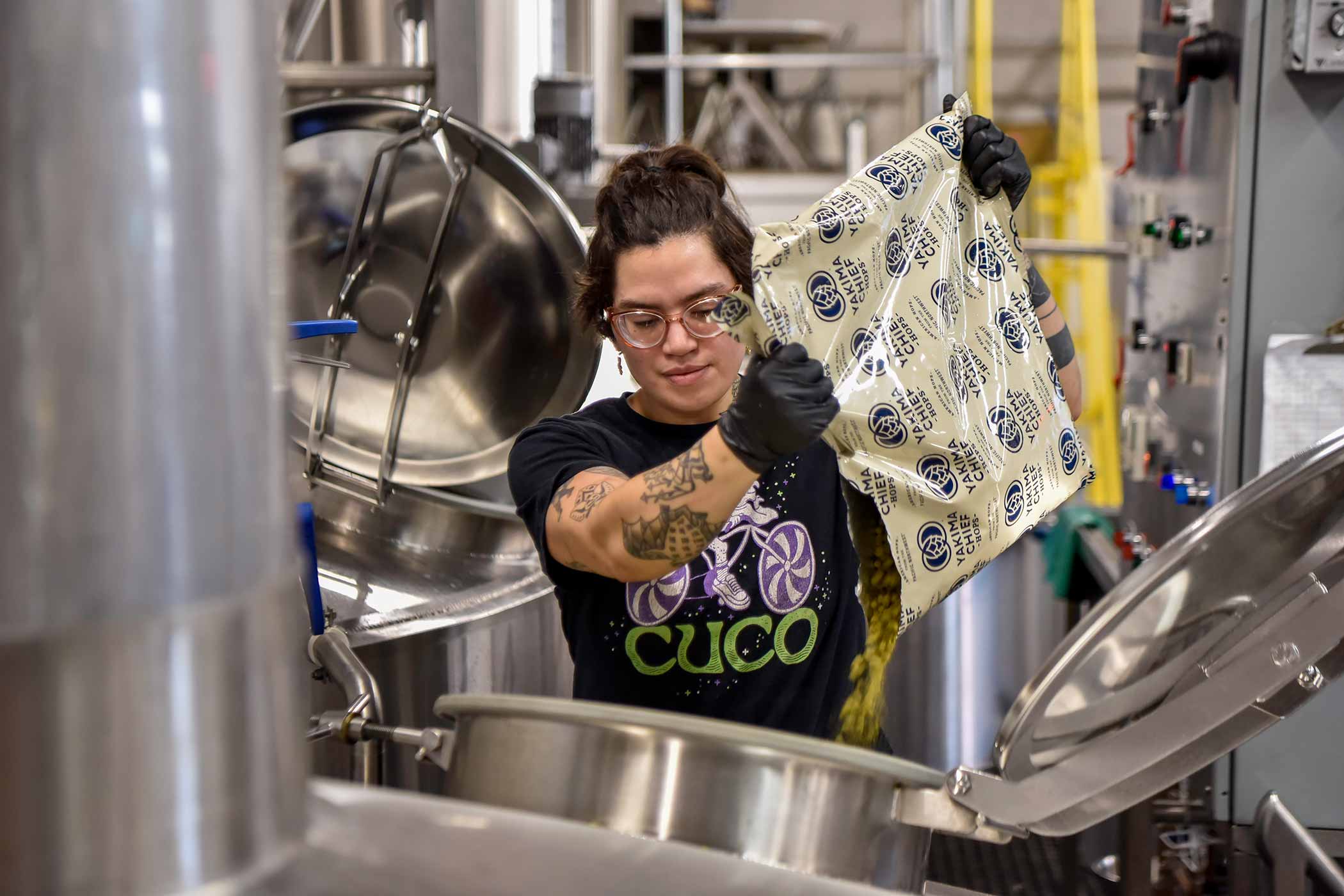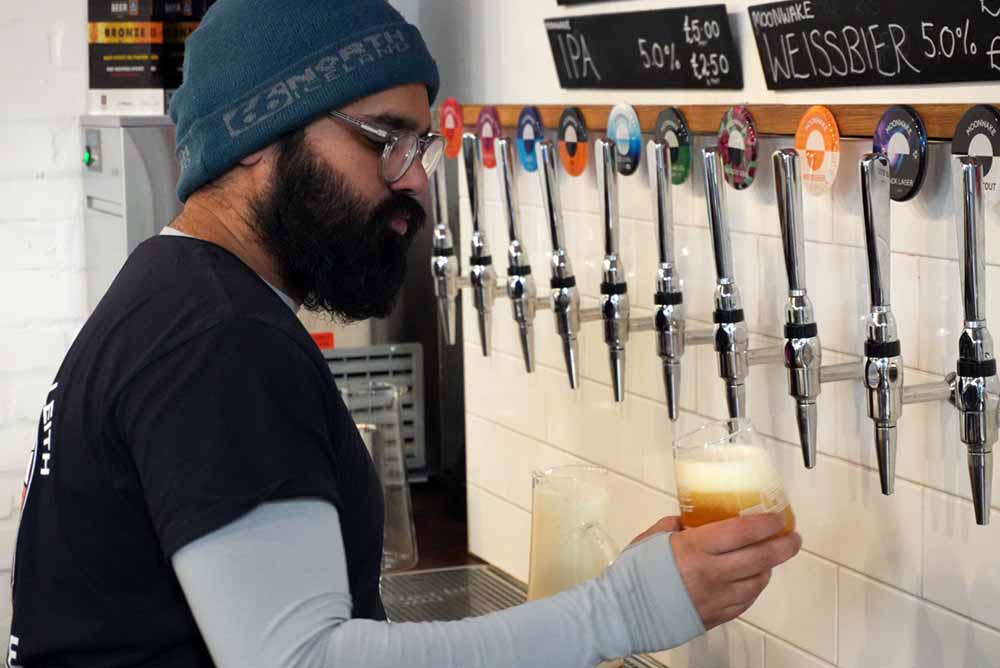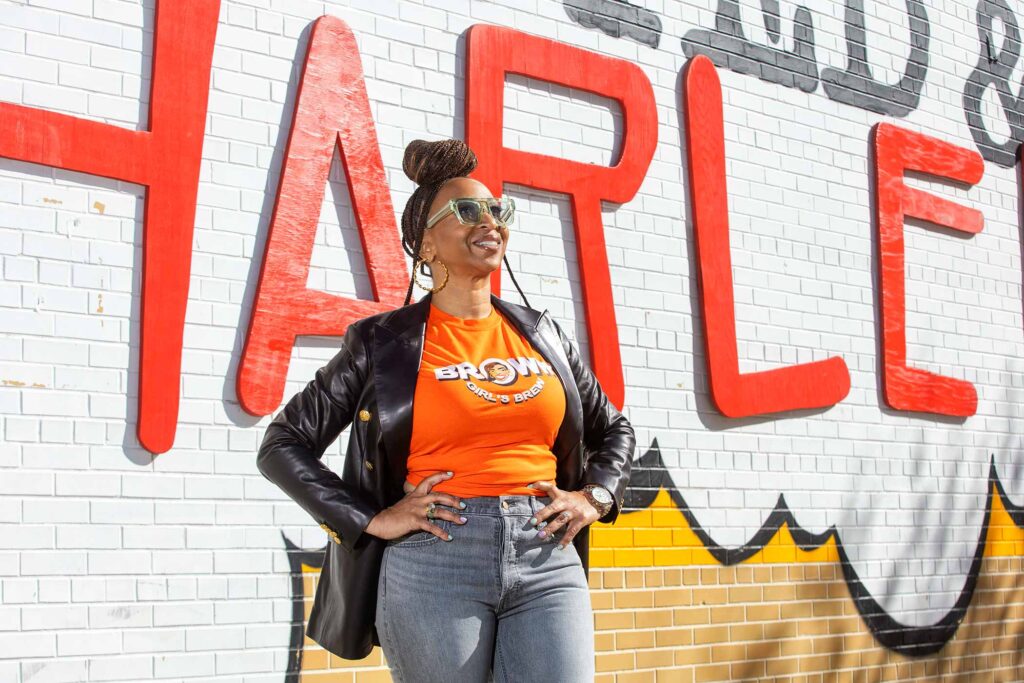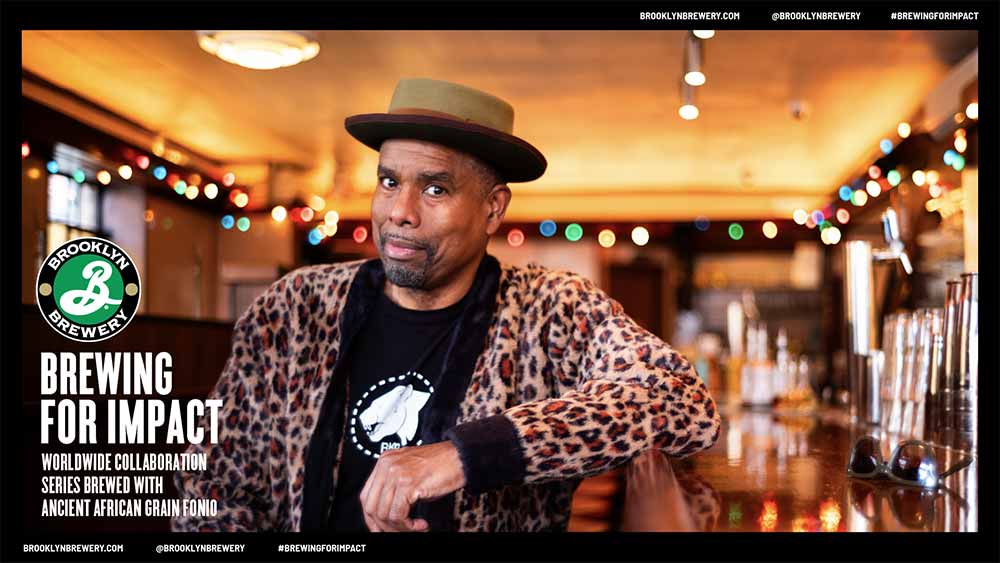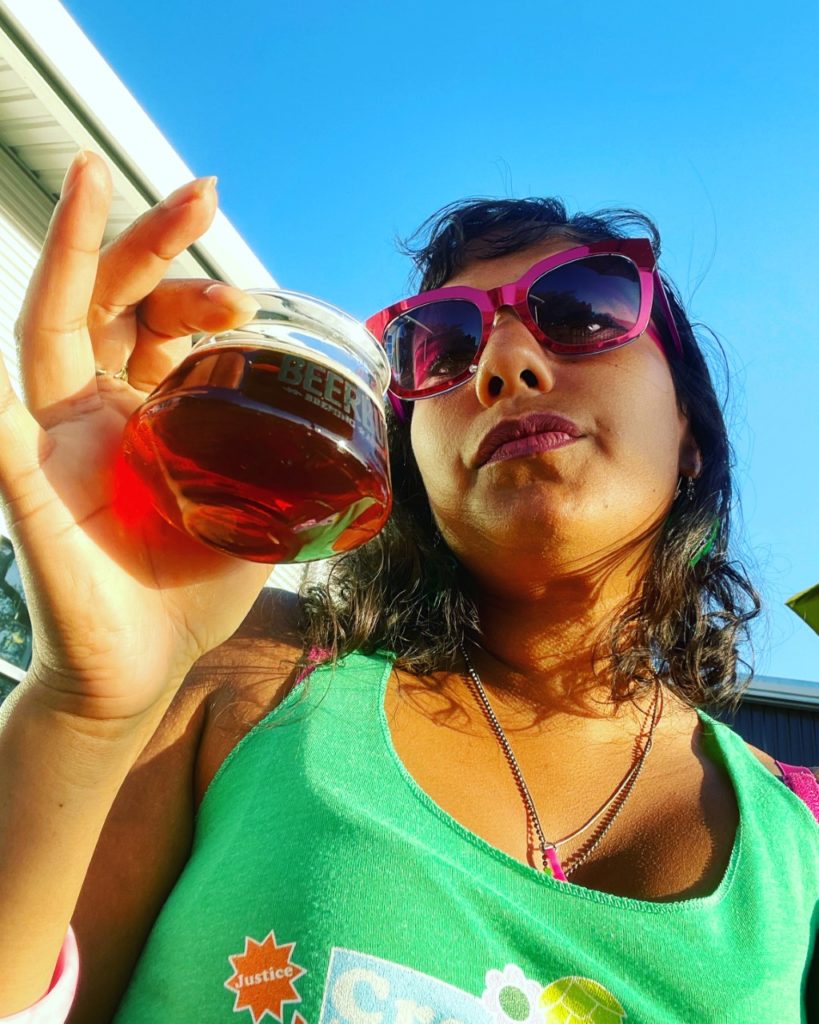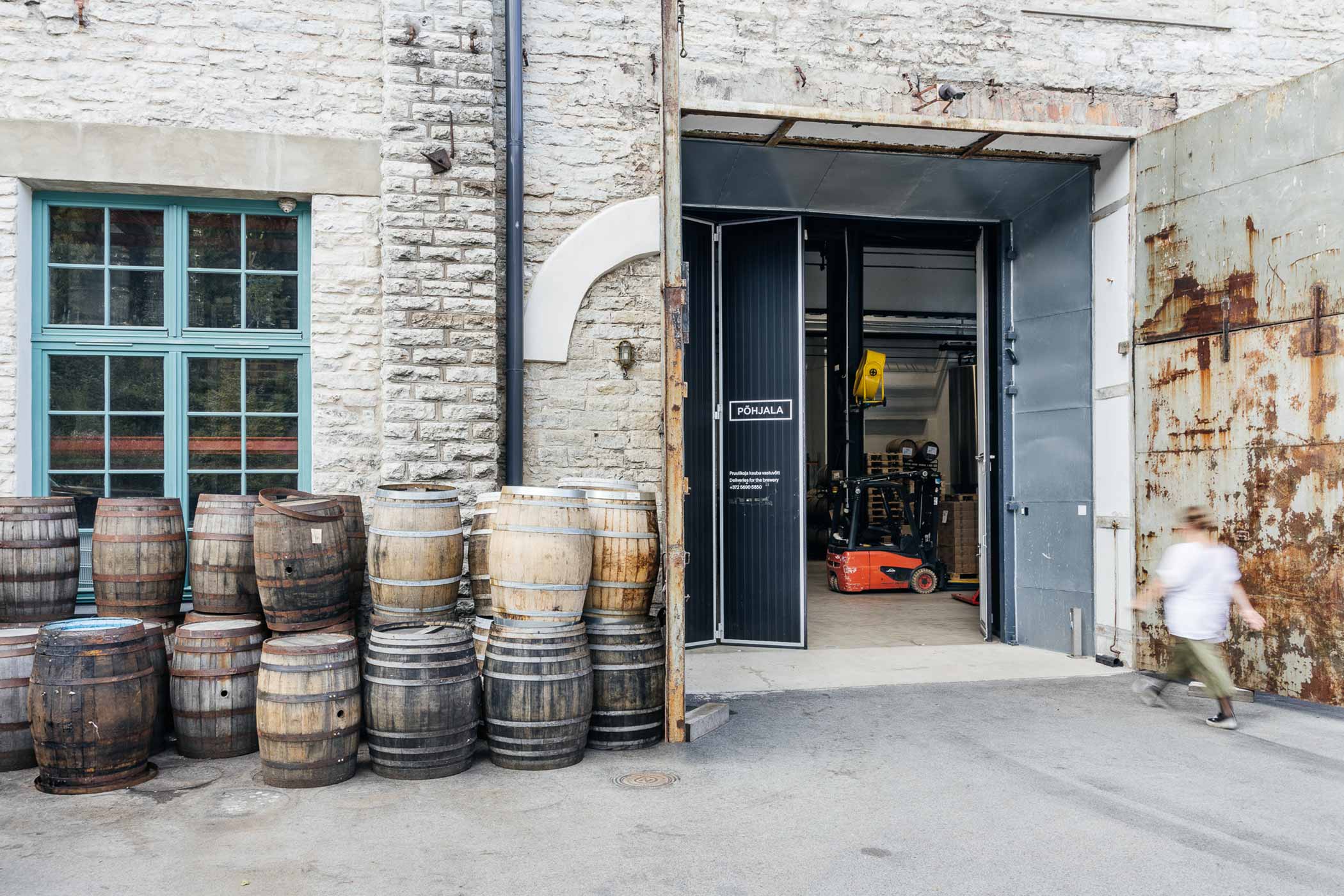Shop
The Top 14 People to Watch in Craft Beer in 2025
The 'Juiciest' Stories of 2024!
We all spend an enormous amount of time appreciating the liquid in the can, but what about the person behind the beer? At the beginning of every year, we take a look at the trends we see driving the industry, the breweries to watch, and the people who, in our opinion, deserve a second glance.
Our list of People to Watch in Craft Beer in 2025 highlights the voices changing craft beer for the better every day; those folx go beyond just clocking in every day and making beer.
The people mentioned here represent Black, Brown, female-identifying, South Asian, Latine, Asian, and other voices in brewing. They all change the industry not only through the beer they brew but also through the sometimes invisible work they do every day.
In 2025, we’re making sure these unspoken voices become a part of everyday conversation. As you start your new year, watch how these fourteen people continue breaking industry boundaries.
Hop Culture’s 14 People to Watch in Craft Beer in 2025
Vinny Rosario
Vinny Rosario
Founder, Moonwake Beer Co.
As much as Co-Founder Vinny Rosario will tell you Moonwake Beer Co. is old-school and straightforward, the beers he’s making and, most notably, the environment he’s creating are anything but.
It’s hard to find a beer at Moonwake that doesn’t hit the mark, whether a Black Lager or a Hibiscus Sour that includes twenty kilos of hibiscus petals.
Named after the moon’s reflection on a body of water, Moonwake Beer Co. embodies these shimmering layers. You can never quite pin them down, yet you are surprisingly impressed by their beauty.
Rosario grew up in New Zealand and trained as a chemical engineer specializing in food and beverage, specifically the dairy industry, before turning his attention to beer.
Walk inside Moonwake’s dappled walls, and you won’t just drink fantastic beer; you’ll find yourself reflecting on what it means to be an inclusive and accessible brewery in the U.K.
“Vinny is definitely one of the few people of color to own a brewery in the U.K.,” Former Moonwake Beer Co. Marketing and Events Manager Sarah Sinclair told Hop Culture Senior Content Editor Grace Lee-Weitz when she visited last April. So he wants to make sure that Moonwake makes beer a safe and welcoming space for all.
“There is a lot of gatekeeping in the craft beer world; it was very much a cool kids club,” said Rosario, whose efforts earned him a spot on Good Beer Hunting’s 2022 Signifiers list. “The whole idea with Moonwake was trying to make it welcoming and accessible.”
Which comes in many forms.
Physically, Moonwake installed a lift, which cost them an extra £20,000 ($25,000) so that anyone could reach its second-floor mezzanine taproom, along with a separate, fully accessible disabled bathroom.
Rosario has a friend whose father had a stroke. Using a wheelchair, he found it hard to access a lot of taprooms—those like Moonwake, whose location near the docks in Leith includes a bunch of bumpy back streets.
Sinclair said they even had a recent customer visit with an elderly dog who used the lift so their pup wouldn’t have to take the stairs.
The ripple effects of Moonwake’s approach have reached many folx. Today, the Queer community has gravitated to Moonwake.
“[Vinny] wanted Moonwake Beer Co. to be approachable to a wide range of people; they wanted to make an inclusive, welcoming space in the taproom, and they want to embrace people no matter where you’re from or who you are,” said Sinclair. “And I like to think that we’ve managed to distill that through the whole business, as well as the technical brewing.”
The way Sinclair spoke of the space reminded Lee-Weitz of places like Trace Brewing in Pittsburgh or Goldspot in Denver, pillars in their own communities.
What started as a warehouse with nothing inside has become a home filled with people of all ages, colors, gender identities, and expressions—all enjoying one thing.
Beer.
One might say Moonwake’s community is as colorful as that iconic mural you see on the wall.
Even as the brewery continues to grow, its ethics are one thing they’ll never compromise.
“It’s not one thing we’ve done or one beer we’ve brewed,” Rosario told me. “It’s just everyone doing the little things well.”
Christina Thomas
Founder, Brown Girl’s Brew®
We haven’t seen anyone out there in craft beer like Christina Thomas.
We think all of you will agree that in today’s industry, with just a whisker shy of ten thousand breweries in the country, that is very, very hard to do.
Thomas’ brand, Brown Girl’s Brew®, transforms cherished pastries into crushable beers. These aren’t just any old recipes.
“I grew up in quite a large family,” says Thomas, the youngest of eight. “My mom was always baking. … She made sure we had desserts all the time.”
With a dream to open a bakery, Thomas’ mother eventually converted a family-owned house in Chicago into a makeshift bakery—Allie’s Cakes & Bakery.
The place became a delicious haven.
“Most of her customers were neighbors, people from her religious community, [and folks who came] from word of mouth,” says Thomas.
Vibrantly spiced carrot cake and crowd-pleaser lemon pound cake were always on the menu, along with specials around the holidays, such as German chocolate cake.
In 2009, Thomas, who first got into craft beer after drinking a Fat Tire, had a brilliant idea.
She wanted to transform her mother’s recipes into beer.
Now known as the Brew Mistress, Thomas has introduced five beers to Brown Girl’s Brew including Carrot Cake Amber Ale, Lemon Pound Cake Lager, Key Lime Pie American Ale, Banana Pudding Hefeweizen, and German Chocolate Cake Stout.
Thomas impressed us and our fans so much that we named Brown Girl’s Brew to our list of “The 11 Best Breweries of 2024.”
Thomas’ mother’s recipes didn’t just feed a community; they fed a community’s soul. Thomas wants to do the same with Brown Girl’s Brew.
“Some of us think that it’s just the liquid that is the main component, and it’s really not,” she told us. “Brown Girl’s Brew is on a mission to make sure we push the needle for diversity, not only in the brewing space but just the entire ecosystem around the beer industry.”
When Thomas first had the idea for Brown Girl’s Brew in 2009, she asked herself, “Who was I going to call?” The list was short or, more honestly, non-existent because the representation didn’t exist.
Which is why it took Thomas many more years to bring Brown Girl’s Brew to life.
Now, she wants to be a leader and mentor for those underrepresented groups looking to open beverage businesses.
In the future, Thomas hopes to open an incubator space in Harlem, NY. Thomas wants to provide resources around not just beer development but the history, science, legal, and technical aspects of running a business. For instance, teaching others all of the laws around applying for liquor licenses or learning how to develop recipes.
“There’s no space like that in Harlem,” Thomas points out, “so it would be a big deal if we had a beer school—that would be super dope.”
Ray Biebuyck
Founder, Hurray’s Girl Beer
For sixteen years, Brewbound has hosted a competition for emerging beverage brands called the Brewbound Live Pitch Slam. Last December, Hop Culture had the opportunity to attend this event in person for the first time.
Through several knockout rounds, entrepreneurs and business owners give two-minute pitches to a panel of industry experts. The winner earns bragging rights, a one-year data and consulting package from NIQ and 3 Tier Beverages, a $10,000 Brewbound advertising package, and a feature on Brewbound.com.
Out of eleven contestants, Hurray’s Girl Beer Founder Ray Biebuyck walked away the 2024 champion.
On a mission to make beer for female-identifying drinkerss that isn’t just splashed in pink, Hurray’s Girl Beer chooses to “change the stigmas of the beer industry, support causes we believe in, be little trolls, and giggle and kick our feet while we do it,” according to the brand’s website.
With a bit of an edge, Hurray’s Girl Beer takes a new approach to busting old stereotypes.
Check out its website, and you’ll find high heels, platforms, and sneakers smashing through a plain silver can of beer.
Biebuyck’s Hurray’s Girl Beer has stomped onto the scene, launching last September with two flavors—Pineapple Yuzu and Blueberry Lavender—and appearing in over eighty stores.
“It’s no secret that the industry has struggled to bring in a younger consumer and broaden its base of female beer drinkers,” Biebuyck told Brewbound. “If beer were able to capture a net new female consumer that is opting for hard seltzer, hard kombucha, and better-for-you beverages, it could represent over a $14 billion opportunity. So we’re aiming to solve just that.”
Biebuyck’s mission and somewhat cheeky approach to bashing gender stereotypes (seriously, check out their IG—@itsagirlbeer) in the industry have us keeping an eye on Hurray’s Girl Beer this year.
And you should, too.
Day Bracey
Founder, Barrel & Flow Fest
We’ve had the pleasure of crossing paths with Barrel & Flow Fest Founder Day Bracey many times. And yet, each time we hear him speak or start up a conversation, we always leave feeling inspired.
Guaranteed.
If you haven’t heard of the Emmy-nominated comedian, podcaster, and festival founder, you’re missing out on life.
Because Bracey is life itself, a breath of fresh air in an industry that sometimes feels full of stale platitudes.
Bracey tells it like it is. And he never holds back. Yet, at the same time that he makes you stop and ponder, in the next instance, he’ll make you laugh. That’s the talent of a true comedian, no?
During the 2024 Brewbound Live conference, which Hop Culture attended in Marina del Rey, CA, Bracey participated in a panel called Welcome: Making Beer Accessible to Underrepresented Groups.
Sporting a charcoal grey crewneck with the words Barrel & Flow raised and etched across the chest, Bracey opened with a bang.
“First and foremost, the thing you should know about me is that I’m Emmy nominated,” he laughed before reminding us, “I wasn’t born Emmy nominated.”
Bracey started working in social services, where, for ten years, he learned how to connect with folks and lower barriers to access. When he got into comedy production, Bracey quickly realized there were two significant areas of funding: grants and alcohol. “As a Black person and an entertainer, I realized very quickly that I’m at the end of that,” he said. “I’m bringing in 300 people, but I’m getting paid $300.”
Bracey had a thought.
“I used to sell drugs, so I know how to cut out the middleman and go straight to the source,” he explained, “so I went straight to the suppliers, the breweries, and said, ‘Hey, I got people, you got booze; why don’t we make this work?’”
Bracey started a podcast interviewing breweries. “We were drunk the whole time,” he laughs, “but we got to interview a lot of cool people, make a lot of connections, get into the brewing industry, and build unique events.”
Bracey brought events to theaters featuring music, comedy, and breweries, which eventually led to Barrel & Flow Fest, the nation’s premier festival featuring Black- and Brown-owned breweries.
For two years in a row, USAToday has named Barrel & Flow Fest the number-one beer festival in America.
And for good reason.
As Bracey explains, Barrel & Flow Fest generates millions of dollars in revenue every year in Pittsburgh. No one who works at the festival gets paid less than $25/hour, and there are no volunteers. Bracey says that they pay their music acts above industry standards, keep their vending fees low so the Black community can access the event, and price their tickets appropriately for a region where the average household income for a Black family is $37,000.
With the price of a ticket around fifty dollars, Day says, “You still have a little bit of money in your pocket to spend with those folks at the festival.”
With around 185 vendors, including 30 food trucks, all focused on Black- or Brown-owned businesses, Barrel & Flow Fest creates an incredible supportive ecosystem accessible to everyone.
Additionally, to pour at the festival, you either need to be a Black-owned brewery or pair with a Black artist or entrepreneur to create a new beverage for the festival. If you distribute the beer, you must pay and credit the Black artist for the label. “There are literally thousands of dollars generated through the labels; thousands of dollars generated through the beer sales and the collaborations,” explains Bracey, who points to an economic impact report released last year that cited Barrel & Flow Fest as generating around $350,000, but he believes that number to be even higher. “I don’t believe they’re counting the money that came out of my pocket and also the amount of money generated at the festival—literally hundreds of thousands of dollars—and then heads in beds and the ripple effect of those artists and different brands who are now in these breweries.”
Looking ahead, Bracey told Hop Culture that he has big plans for Barrel & Flow Fest this year and hopes to bring the groundbreaking festival to another city for the first time.
Bracey has already created a legacy, but we expect him to continue making the best beer festival in America even better.
“We’re not doing this for funsies; we’re doing it because it adds to the quality of the product,” he said in all seriousness. “We are the best beer festival in America, and the only people who doubt that are the ones who haven’t been there yet.”
So get yourself there this year.
Leon Loza Sr. & Leon Loza Jr.
Founder & Farm Manager, Loza Farms
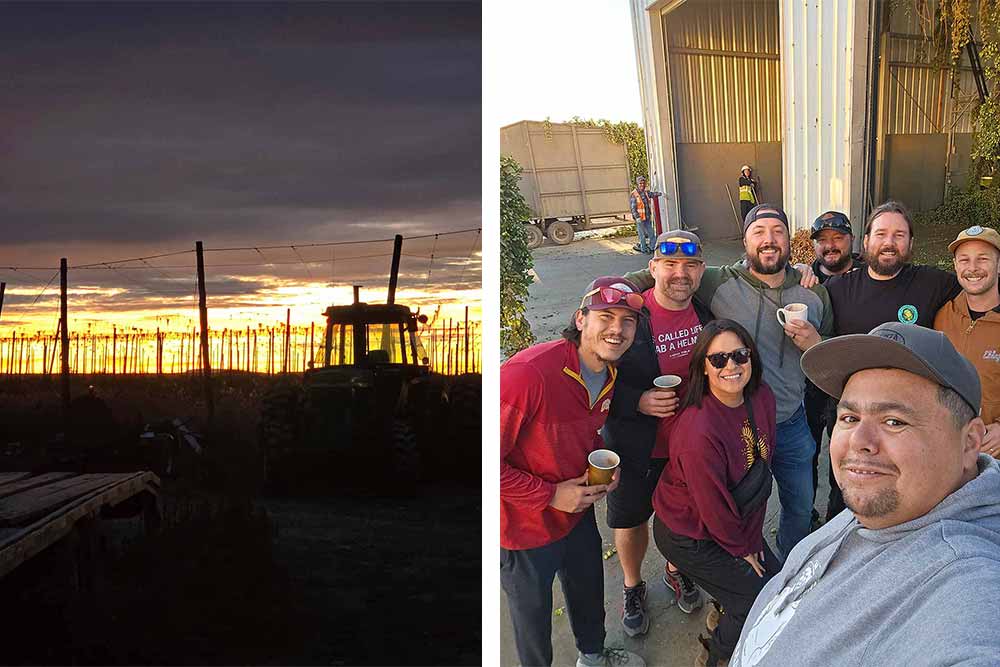
Loza Farms Farm Manager Leon Loza Jr. (front right) | Photography courtesy of Loza Farms
When Hop Culture visited the Yakima Valley last fall, Senior Content Editor Grace Lee-Weitz and Social Media Manager Magic Muncie spent time on quite a few hop farms.
One, in particular, stood out.
During this past harvest at Loza Farms, an entire CTZ hop yard fell over in the middle of the harvest. The irrigation ditch broke, flooding the anchors and dragging down all the poles in the yard.
Instead of calling it a loss, Farm Manager Leon Loza Jr., aka “Junior,” and his brother started picking, working for three days straight on four hours of sleep each night. “We got like eighty percent of the hops off,” Junior said proudly.
It’s nothing if the perfect story parable for Loza Farms.
“We’re a first-generation hop farm; we have to make it work,” explained Junior, who, in his free time, likes to dabble in carpentry and raises his own pigs, cows, goats, and chickens. “You don’t have a choice. I don’t cry about it. Tears are only going to go so far.”
Known as one of, if not the only, Hispanic-owned commercial hop farm in the entire country, Loza Farms is a family affair.
As Junior drove us in his truck through the just-picked hop fields, he shared the family’s enduring story.
Junior’s father, Leon Loza Sr., started the hop farm in the early 2000s. Although, to truly understand the bones of Loza Farms, you need to travel back much, much earlier.
Born in Jalostotitlán, Jalisco, Mexico, Leon Sr. dropped out of school at eleven years old to find a job. He helped build roads for the government to earn money to pay for his grandmother’s medicine.
“He was driving heavy machinery by the time he was fourteen,” explained Junior.
In the late 1970s, at age fifteen, Leon Sr. made the dangerous crossing to the U.S., joining an uncle who worked in the hop fields in the Yakima Valley.
He worked at a Wapato hop farm owned by Stanley Brulotte, where he eventually became a year-round salaried employee.
Sixteen years later, Leon Sr. rented twenty acres of vacant farmland from Brulotte, making enough his first year to buy a house.
“That house wasn’t a house,” laughed Junior. “It was a shack.” But despite not having running water, the house became a home.
Fourteen years later, after Brulotte and his wife passed away, Leon Sr. bought the fifty-six-acre hop farm.
At the time, in 2006, “hops weren’t worth anything,” Junior explained. “The land wasn’t worth very much…so the amount of money we paid for the farm was nothing to what it would be [now].”
The margins were so low that “my parents didn’t make any money that [first] year,” said Junior. “They lived off their rental house income.”
Junior, the eldest of four children, grew up working on the farm. At thirteen, he was first paid to help with a hop harvest. Tasked with separating vines, Junior would untwist tangled knots from six in the morning until two in the afternoon. He made a hundred bucks a week.
As the craft industry bloomed, so did Loza Farms hop production, which now includes 365 acres.
Today, Loza Farms is the only known Latine-owned commercial hop farm in the U.S.
During harvest, Junior says you’ll probably find him welding and fixing something in his parts shop while his dad wanders around wearing jeans and a denim shirt. “The whole Canadian tuxedo thing,” laughs Junior.
But all joking aside, for Junior, it’s all about two things: growth and connections.
“I think we have to keep growing because if we don’t grow,” he said, “we’re going to die.”
But more than just the hops in the field, Junior believes it’s essential to make that connection from farm to table, from bine to brewery.
He networks as much as possible, visiting breweries, doing collabs, attending beer festivals, and, of course, hosting brewers (and folks like us) at the farm.
“I say yes to everything,” he laughed. “When people DM me, I always say yes.”
For the past five years, during harvest, Loza Farms has hosted Mexican Night. The Loza family welcomes industry folks to enjoy Mexican music, food, and, of course, beer brewed with hops from Loza Farms.
This past harvest, Junior estimates 250 people came through.
“I’m living the American dream. I enjoy what I’m doing…but whenever I do something with Mexican brewers, it’s different,” said Junior. “It’s somewhere I fit in. You know what I mean? It hits differently.”
Together, this family has scrapped, scraped, built, re-built, planted, and replanted the roots to something truly special.
They’ve never forgotten how far they’ve come and how far they still want to go.
Gali Hernandez
Brewer, Grimm Artisanal Ales, and Recipient of the Sir Geoff Palmer Scholarship for Brewing at The Michael James Jackson Foundation
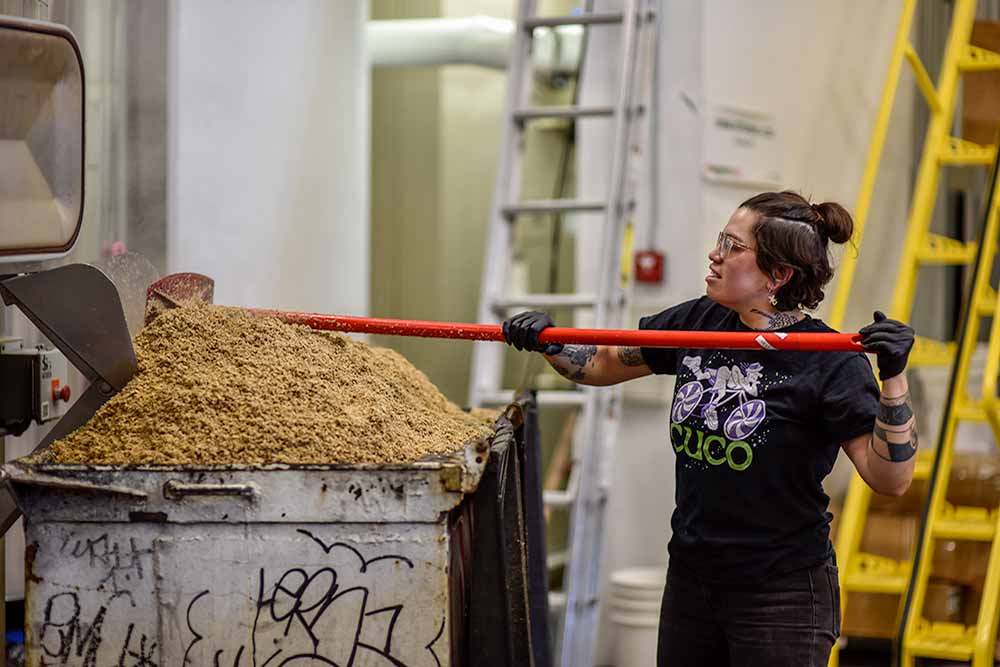
Photography courtesy of Miguel Rivas
Venezuelan-American brewer Galadriel (Gali) Hernandez joined the recent crop of The Michael James Jackson Foundation for Brewing & Distilling (The MJF) award recipients, announced last October.
The Sir Geoff Palmer Scholarship for Brewing awardee, who will attend Siebel’s WBA Advanced Brewing Theory Program, says beer has always been a part of her life.
“I remember being in Venezuela visiting family and going with my aunts and uncles to buy plastic crates of beer to bring to play dominoes or for my cousin’s baptism,” Hernandez shared with Hop Culture. “Beer was always a connection of joy and community.”
Starting as a production intern at Bronx Brewery, Hernandez worked her way up.
Currently a brewer at Grimm, Gali says she feels “super honored and humbled” to join The MJF cohort.
Beyond improving her skills, Hernandez has long-term goals to change and evolve the industry.
“Ultimately, I want to work in mentorship for future brewers, especially BIPOC brewers,” she said, “being there as support or providing resources and sharing knowledge.
As a first-generation Latina, Hernandez says her family has inspired her and always taught her to always help others.
Hernandez’ parents moved to the States for post-graduate education, working nights while attending school.
“Sometimes my coworkers tell me that I work hard,” said Hernandez, “but I have a whole other example of what working hard looks like.”
She adds, “As Latinas, we definitely have this weight that we carry of needing to fulfill all of these things our parents have gone through, the dreams they have for us. I still feel that weight, but it’s also a huge inspiration for me.”
Now, Hernandez has made it her mission to inspire others.
We can’t wait to see how Hernandez shapes the industry in the years to come.
Editor’s Note: Hop Culture will be starting a new bi-monthly feature called Varsity Brews, which will profile a new MJF recipient every other month. Keep your eyes peeled for the first in the series featuring Gali Hernandez dropping soon!
Simon Chen and Johnny Weng
Co-Founders, Match Point Brewing
2024 Brewbound Live Pitch Slam semifinalists Simon Chen and Johnny Weng opened Match Point Brewing in Albany, CA, with the goal of fostering community through friendly competition.
Doubles tennis partners at Albany High School, Chen and Weng believe that sports, much like beer, can serve as a focal point for bringing people together and sharing stories and memories.
Which could explain the brewery’s name and tagline, “Game-changing beers crafted with pride and purpose.”
Beers like a Jasmine Rice Lager, Mandarin Wheat Ale, and Vietnamese Coffee Lager also display some of Chen and Weng’s backgrounds and heritages.
In last year’s piece, you may have seen us profile the Korean-owned and inspired Dokkaebier. We loved seeing how founder Youngwon Lee incorporated ingredients such as kimchi into his beers.
We’re encouraged to see more breweries like Match Point popping up on the scene.
Garrett Oliver
Brewmaster, Brooklyn Brewery
Groundbreaking Brooklyn Brewery Brewmaster Garrett Oliver celebrated his thirtieth year at the brewery last year.
For over three decades, the James Beard Award-winning brewmaster has changed the shape of the industry, breaking barriers and starting initiatives like The Michael James Jackson Foundation for Brewing & Distilling.
How could Oliver celebrate his belief in beer’s power to unite people, cultures, and traditions while leaving a lasting legacy with a tangible impact on the future?
Rolled out through 2024, Brewing for Impact brought together a coalition of brewing partners around the world—Maison Kalao from Senegal, Thornbridge in the U.K., Omnipollo in Sweden, Carlsberg in Denmark, Russian River in California, Jing-A in China, Guinness in Ireland, and, of course, Brooklyn Brewery in New York—to brew a series of collaboration beers with a versatile, climate-resistant West African grain called fonio.
Oliver doesn’t quite know how to put it, but he says with Brewing for Impact, “I’m connecting all the pieces of me together in this project as a brewer [and] as an African American.”
According to Oliver, it was essential for him to work on a project that showed the common misconceptions about the history of beer.
“If you look at the way we approach brewing in the United States and the West, the folks that we always think of as the progenitor of our great brewing culture are folks like this,” says Oliver, pointing to a sign of a Victorian-era British beer called Joule’s Stone Ale and Royal Stout over his left shoulder before switching to his right shoulder to show the artwork of an African woman. “In fact, it’s her.”
Oliver explains that beer brewing in sub-Saharan Africa, along with Sumeria and parts of China as well, probably dates back beyond 2500 B.C. “Americans and other Western societies tend to [think of] beer as ‘European,’ [but] this, if nothing else, is simply historically false,” says Oliver. “It’s the beer equivalent of claiming that Elvis Presley invented rock and roll. But to this day, the vast majority of Americans think Elvis wrote ‘Hound Dog’ and have never heard of Willa Mae Thornton; this is galling, to say the least—no less in beer than in other areas of culture.”
Candidly, he says there’s a reason his Zoom background includes representations of both English and African cultures.
“Of course, as Westerners, we largely brew in Western styles and with Western ingredients. There’s nothing wrong with that, and I obviously love traditional European beers,” he says. “But we are missing out on other flavors and, in the case of fonio, excellent brewing grains that can be used to bring bright new flavors and deeper sustainability to our beer culture.”
He continues, “I think that fonio is the best one I’ve ever seen.”
The five-thousand-year-old miracle grain has been cultivated in West Africa for thousands of years. “It could be the oldest cultivated grain in Africa,” wrote Pierre Thiam, chef and founder of Yolélé, a company focused on making edible products with fonio.
Packed with nutritional amino acids not found in other grains, such as barley, rice, and wheat, fonio is also highly resilient.
“It can mature within two months, so farmers know that they can rely on fonio when other crops fail to grow, which is why it’s also nicknamed ‘hungry rice,’” wrote Thiam in an email to Hop Culture.
Despite all these wonderful attributes, incredible local grains like fonio are often considered substandard in the West. And when they are prized (read: quinoa quagmire), they’re frequently co-opted and industrialized.
Brewing for Impact, like Yolélé, pays African farmers a fair price for the grains they use to brew.
“We in the West generally come and take things,” Oliver explains. “Here’s an opportunity to give something back to these communities. … On every level, culture, social justice, environment, flavor, and ease of use, fonio basically ticks every box.”
Oliver’s project garnered plenty of attention last year, with Brewbound naming Brooklyn Brewery’s Fonio Rising pale ale the Brewbound 2024 Product of the Year.
What’s in store for Oliver’s thirty-first year?
We expect more big things.
Ruvani de Silva
Beverage and Food Writer
Time for a little humble brag.
British Sri Lankan freelancer Ruvani de Silva has written several pieces for Hop Culture. Most recently, her piece “Patagonia Provisions Launches First National Regenerative Organic Certified® Kernza® Brewing Project” picked up gold from The British Guild of Beer Writers for the Best Communication about Sustainability in Beer and Pubs.
In a banner year for the incredible writer who never shies away from tackling subjects of race, sustainability, and boundary-breaking in our industry, de Silva racked up five awards, including The Michael Jackson Award for Beer Writer of the Year.
“No writer has improved more year on year than Ruvani,” said former Beer Writer of the Year and British Guild of Beer Writers Chair of Judges David Jesudason in a press release. “She shows how learning, listening, and educating yourself are the three most important steps to being an accomplished journalist. Without Ruvani’s work, vital voices in the beer world would never have been heard.”
We’ve been absolutely honored to work with de Silva over the last few years and are so excited to see what subjects she’ll tackle in 2025.
Hit the button below to read her gold-medal-winning piece!
Jon Renthrope
CEO and Founder, Cajun Fire Brewing Company
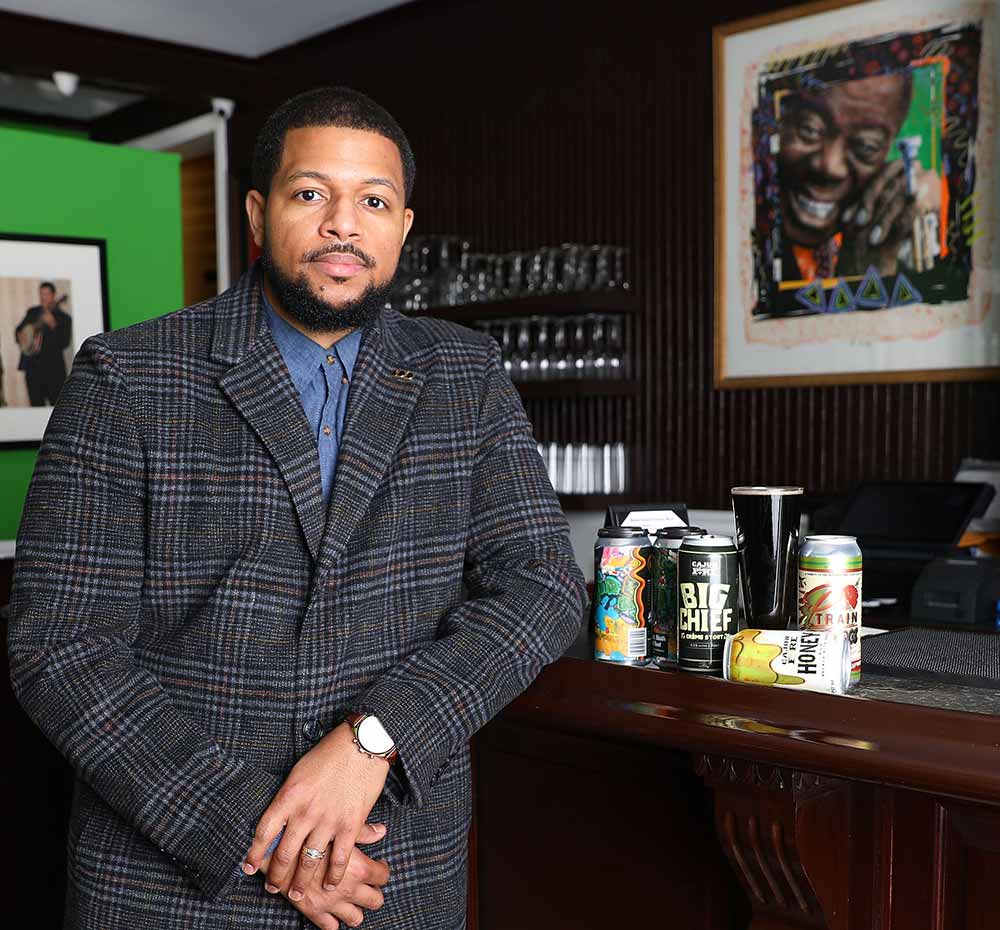
Equipment and capital are the two highest barriers to entry in the craft beer industry, especially for underrepresented communities. To help Brewers of Color overcome these hurdles, the National Black Brewers Association (NB2A) introduced the Brewing Equipment Donation Grant Program last year.
The initiative aims to connect Black and Brown brewers with seasoned, often expensive equipment donated from breweries who no longer need it.
In 2024, Cajun Fire Brewing in New Orleans received a twenty-barrel brewhouse generously donated by Russian River Brewing Company, and Montclair Brewery in New Jersey took over a packaging line supplied by the now-closed Optimism Brewing in Seattle, WA.
As a press release from the NB2A stated, this was more than just an equipment donation; “this is a powerful reminder of the collective strength within the brewing community to lift each other up and create lasting change.”
Cajun Fire Brewing CEO and Founder Jon Renthrope has spent years building his business.
A serial entrepreneur who started selling CDs in high school in the early 2000s, Renthrope discovered homebrewing in college at the University of Florida. Apprenticing at NOLA Brewing under former president and CEO Kirk Coco, Renthrope eventually set out on his own, entering competitions and showcasing at beer festivals.
Starting Cajun Fire in 2011, Renthrope once told me he had “gotten too far from the lighthouse financially to swim back.”
But for the first Black-owned beer company in the Southern U.S., Renthrope, also Native American, says finding a place in this space has been the biggest challenge.
Despite raising over $900,000 for his community through Cajun Fire, Renthrope says not one bank agreed to give him a loan. He has paid for everything out-of-pocket. “A lot of disparities still exist in those institutions,” he says, noting these are the types of straight-up systemic hurdles he experienced as a Black brewery owner. “Just being anything that ain’t heterosexual, white, or male, anything of ownership, even like women of any creed [or] color, you got your cards stacked [against you] … you’re not really accepted at face value and … you got to jump through all kinds of hoops and hurdles.”
Eventually, Renthrope purchased a fourteen-acre commercial development in East New Orleans off I-10, planning to open a cultural hub with a museum preserving local art and culture, a ghost kitchen available to underrepresented food business owners, and a Cajun Fire taproom as the anchor.
“We’re building one of the largest food and beverage tourist attractions in Louisiana,” says Renthrope. “But it’s been a hell of a ride.”
Several years later, Renthrope still hasn’t broken ground. In the meantime, we previously reported how people vandalized the property, stole fencing, and destroyed signs. (Renthrope says he eventually stopped buying new ones because they cost him $600-$800 each time.)
“I’m a market disruptor,” says Renthrope, who seemed to shrug all these incidents off as just par for the course.
Despite all the challenges, Renthrope remains optimistic, mentioning how important this equipment donation will be for his business.
“The impact this is going to have on my general livelihood, as well as my family and my staff, should not be understated,” says Renthrope in his soothing Southern drawl. “That this is the [system] that made Pliny the Elder, that’s the cherry on top.”
Renthrope, who hopes to open his cultural hub by the end of 2025 or early 2026, plans to use the old Russian River brewhouse to make some of Cajun Fire’s premier beers.
Needless to say, we’re thrilled to hopefully see Renthrope bring this dream and cultural icon to reality this year or next.
Rick Lyke
Founder, Pints for Prostates and Denver Rare Beer Tasting
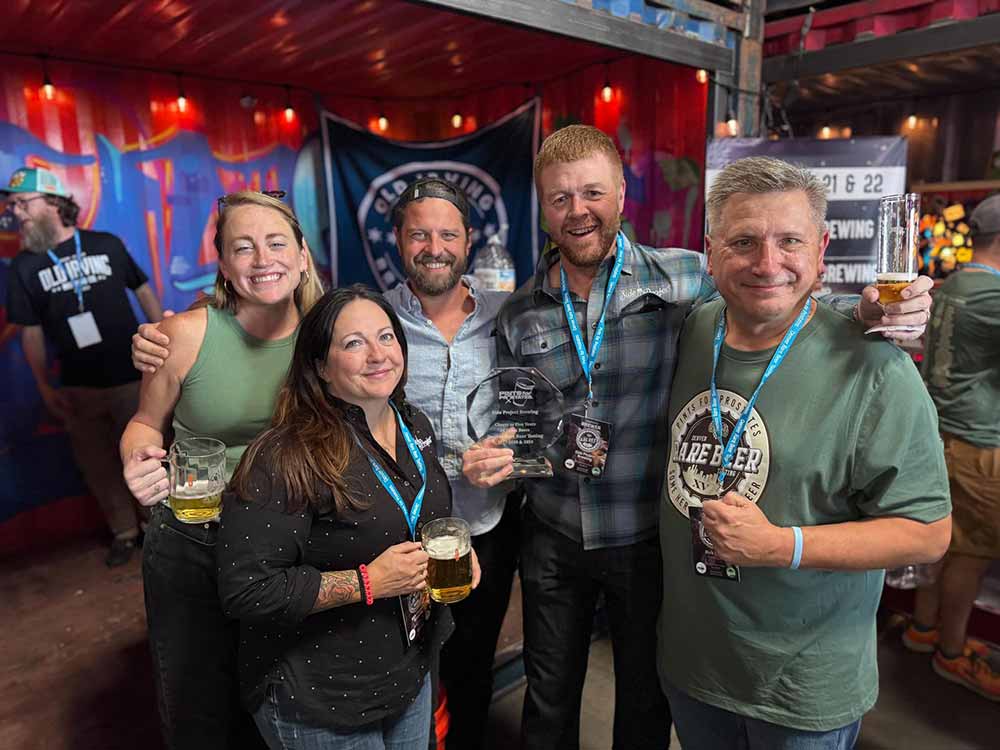
Pints for Prostates Founder Rick Lyke (first from the right) celebrating his fifteenth Denver Rare Beer Tasting | Photography courtesy of Magic Muncie | Hop Culture
At first blush, Denver Rare Beer Tasting may seem what it says: a festival that has taken place tangentially to the Great American Beer Festival (GABF), offering some of the rarest beer in the country.
But you need to look a little closer. You need to notice the tent outside the entrance, where people roll up their sleeves to get their blood drawn.
You need to start speaking to the brewers, who have all donated their beer.
And you need to meet Rick Lyke. He’s the man running around from table to table, shaking people’s hands, smiling, talking, and laughing.
Lyke is also a cancer survivor. And his one goal in life is to save as many others as possible: one Pint for Prostates at a time.
At forty-seven years old, Pints for Prostates Founder Rick Lyke was diagnosed with prostate cancer.
He caught it early.
Thanks to his friend Michael Cunningham, who had stage four prostate cancer and started “encouraging every guy he knew to get screened,” says Lyke. “My doctor didn’t even want me to do the PSA blood test because he said my insurance wouldn’t cover it.”
But spurred by his friend, Lyke insisted, telling his doctor, “We’re doing the test.”
Diagnosed in late 2007, Lyke traveled to Chicago for surgery in 2008, thinking about how he could do what his friend did for him. How could he pay it forward?
A week after the surgery, Lyke’s wife asked him: Hey, are you serious about this Pints for Prostates?
Lyke looked at her dumbfounded, “I don’t even know what you’re talking about.”
Turns out that while medicated, Lyke had shared an idea: Pints for Prostates, an organization that, through beer, would raise money and awareness around prostate cancer.
“I’m one of those believers,” he told me. “Whatever you say when you’re drunk, you should do when you’re sober.”
Today, Pints for Prostates hosts events like Denver Rare Beer Tasting to bring awareness to early detection.
“Prostate cancer is virtually one hundred percent survivable when detected early,” says Lyke, noting that 35,000 people with a prostate will die from prostate cancer this year. “That’s really frustrating … [because] those are our dads, our brothers, our colleagues, our friends.”
Early detection is critical. But going to the doctor isn’t much fun.
Going to a beer festival, however? Well, we all know that sounds much more enjoyable.
At a Pints for Prostates event, you just walk over to a tent, roll up your sleeves, and get tested. “It takes five minutes,” says Lyke. “And it’s free.”
Plus, Breweries donate all of the beer, meaning one hundred percent of all ticket sales can go straight to Pints for Prostates, with a portion of those dollars going to the Prostate Conditions Education Council, which organizes free men’s health screening clinics across the country.
Last year, Pints for Prostates raised $74,723, increasing its total to $2,177,055 all-time.
With Pints for Prostates, Lyke has done something rare. He’s taken something uncomfortable and unspoken about and brought it front and center to young people.
“It struck me when I was forty-seven years old,” says Lyke. “It’s not an old man’s disease.”
According to Lyke, one in eight people born with a prostate will develop prostate cancer in their lifetime.
That’s anyone with a prostate, whether you’re male, nonbinary, or trans.
“I wish I had a dollar for every time somebody said to me that you don’t die from prostate cancer,” says Lyke. “[Anyone with a prostate] can die with prostate cancer.”
Lyke urges that “it’s not like when your grandfather had prostate cancer.”
The survivability rate is way up, the surgeries have vastly improved, and the side effects people used to worry about can be avoided, especially with early detection.
But there’s no way around it: getting yourself checked as soon as possible is the key.
Lyke could not stress this enough. At the end of the day, Pints for Prostates and Denver Rare Beer have one goal: to prevent unnecessary deaths from prostate cancer.
So, if you see that guy with a vast grin walking up and down the line, encouraging you to step over for just five minutes, don’t think twice about it.
“Hey, you’ve got a prostate,” says Lyke. “Get screened and take care of your health.”
And then go drink some of the rarest beer you’ll ever find.
Seems like a win-win.
Breeze Galindo
Director of Operations, Michael James Jackson Foundation
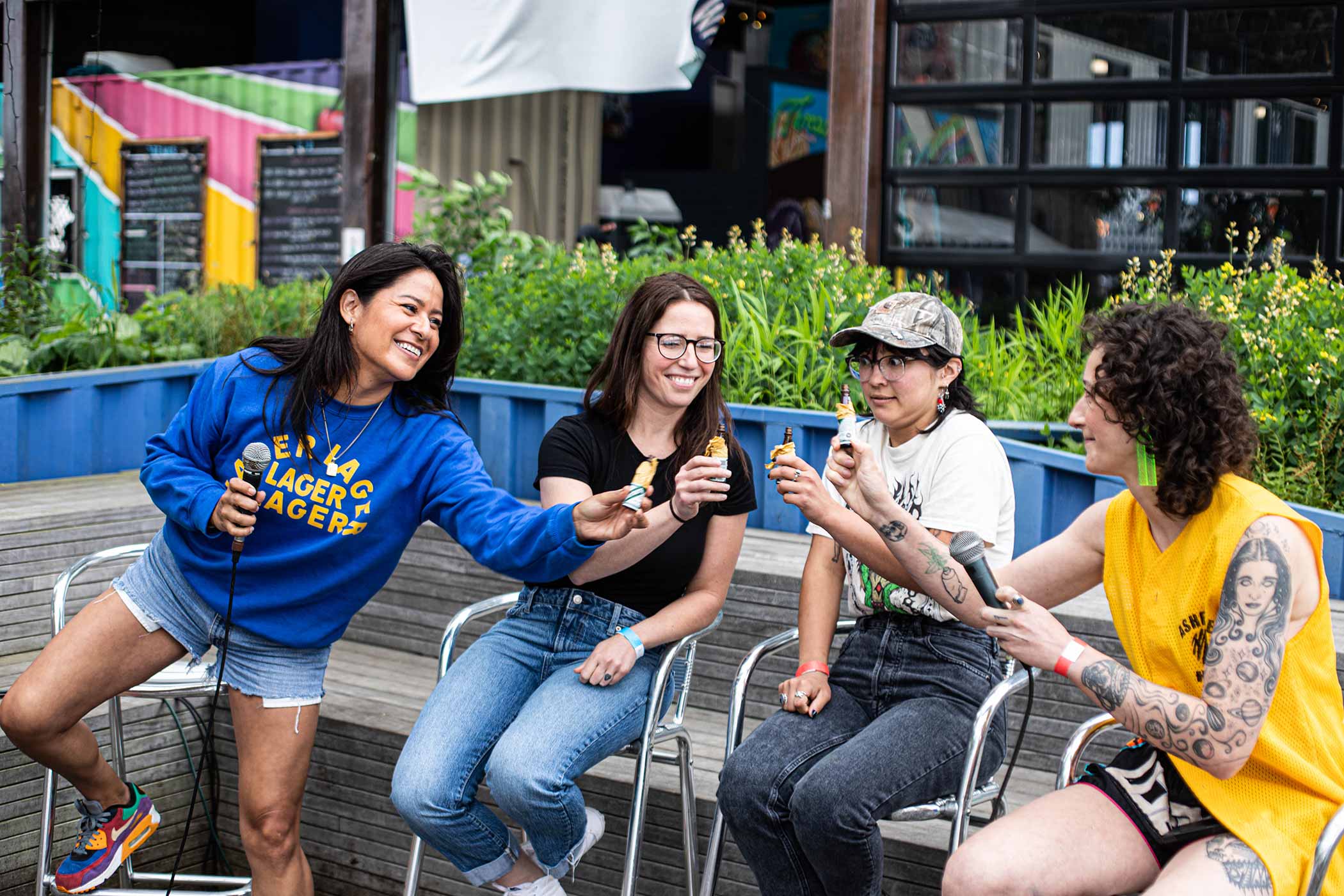
Scenes from Log Jammin’ III in 2023 with MJF Director of Operations Breeze Galindo on the left | Photography courtesy of Jose Manchola (@yankeerunner77)
In a first for Hop Culture, we’ve spotlighted someone on this list twice. In 2022, we named then-brewer at Other Half Breeze Galindo to our list of the “10 People to Watch in Craft Beer in 2022.”
The year prior, Galindo had launched the Other Half Women’s Forum, which organized panels and conversations around sexism and racism in the industry. Galindo invited speakers from female-owned Three Weavers and Grimm, along with KCBC and Burial Beer Co., to name a few.
Galindo has become a beacon in the industry, jumping through hoops and hurdles to build her reputation.
When she first started brewing, Galindo had few, if any, support systems.
“Starting off as a woman of color in the industry, where nobody knew me, nobody would give me the opportunity,” she shared with Hop Culture, “I would get laughed at. There’s just the whole discrimination and harassment part.”
For the beer-lover who says brewing always appealed to her because her severe ADHD and dyslexia made working with her hands more appealing, the opportunities were limited.
“I didn’t know you were supposed to go to brewing school; I didn’t know you were supposed to have internships in Germany,” says Galindo. “I didn’t know you were supposed to know people.”
In fact, when Other Half offered her a job in 2019, she says she didn’t even truly understand the gravity of this brewery. “I didn’t know anything about the DDHs of the world, how massive was this brewery, or Broccoli and Forever,” she says.
But the offer was too good to pass up—401k, full benefits, and a liveable wage. The only stipulation? “I interviewed on July 4th, was offered the position on July 10th, and had to move to New York within a two-week period to be on the floor with my boots on, ready to go,” says Galindo, who stopped working at her brewery in LA on July 27th and moved across the country for her first day at Other Half on July 29th. “I didn’t have the opportunity that some people in the industry have to take a month off and travel. I couldn’t explore New York for two weeks before starting. … I had no money. I had no choice. ”
She continues, “On Friday, I left everything that I knew and loved, moved to a city I’d never been to in my life, not knowing where I was going to live, and just started working on Monday.”
Despite all these challenges, Galindo channeled her experiences into positive outcomes.
During her four years at Other Half, Galindo started the aforementioned Women’s Forum.
“Brewing beer doesn’t have to be just for men,” she says. “It could be for anybody who is just as passionate and curious.”
Word of her work reached Brooklyn Brewery Brewmaster Garrett Oliver, who had just started the MJF and was looking for board members.
He reached out to her via Zoom. “‘Hey, so I’ve heard about you,’” Galindo recalls him saying in the first meeting. “He told me, ‘Hey, you get to sit on a board to create something and offer opportunities for people who look like you so that they don’t have to go through what you went through.’”
Galindo was one hundred percent in. During her time at the MJF, she didn’t miss one meeting, she pioneered a mentorship program, and she brought an overall zest and enthusiasm to her role.
“To become a brewer in this industry, yes, it should be challenging, but it should never be harmful,” Galindo says. “Through my work for the MJF, I want to create a space of empowerment and, yes, challenges, but I never support a space that’s harmful to anybody trying to find their own role in the industry.”
The experience at the MJF was utterly different from any other Galindo had in the industry.
“It’s hard to explain to people who have never been in this experience,” says Galindo. “To be in a foundation where all the board members are People of Color, to start a new mentorship program, and to be nominated for it was the first time ever in my career where I was encouraged, empowered, and put in a place of success because they believed in me.”
In November 2023, the MJF board voted Galindo to take over as director of operations.
“I got really emotional and even texted Garrett, saying this has never happened before and just thank you for believing in me,” shares Galindo. “Garrett was like, ‘You’re the one that’s done all the work; you’re meant for this role.’”
In her first year at the helm, The MJF reached fifty scholarship candidates and earned Brewbound’s 2024 Cause of the Year.
All in all, it has been a pretty successful inaugural year for Galindo, and we’re one hundred percent confident big things are still to come from her and The MJF.
Editor’s Note: Hop Culture will be starting a new bi-monthly feature called Varsity Brews, which will profile a new MJF recipient every other month. Keep your eyes peeled for the first in the series featuring Gali Hernandez dropping soon!

